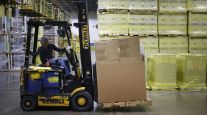Trailer Orders, Shipments Soar, Led by 417% Jump for Dry Vans
This story appears in the Feb. 7 print edition of Transport Topics.
The freight-trailer industry rebounded sharply during 2010, with orders more than doubling to 166,500 and shipments rising 52% over 2009 to 119,900 units, ACT Research Co. reported.
In December, manufacturers received orders for 22,915 trailers, while in all of 2009, manufacturers shipped just 79,028 new trailers and received orders for 81,300 units, ACT said.
Kenny Vieth, ACT’s senior analyst, said the increase had to be put into perspective, because 2009 constituted the lowest figure for trailer orders since 1975.
“But even though we’re still below replacement levels, we’re certainly on the upside of the cycle at this point, with all of the obstacles standing between the industry and healthy demand overcome,” Vieth told Transport Topics.
He put the replacement rate at about 160,000 units.
Seven of the nine trailer categories reported triple-digit year-over-year increases in orders for December, led by a 417% gain in dry vans, the largest trailer segment, ACT said.
“The recovery in the new-trailer market is real and we’re seeing it,” Craig Bennett, senior vice president of sales and marketing at Utility Trailer Manufacturing Co., City of Industry, Calif., told TT.
“Our capacity is not enough to meet this demand, and we’re hiring every person we can in all four of our plants, and we’re training all the people we can find,” Bennett said. “You can increase output only as much as you can increase your workforce, but our training period is intensive.”
Bennett said the strongest demand was for dry vans and refrigerated trailers, while the flatbed market was still hampered by weakness in construction and government markets.
Glenn Harney, chief operating officer of Hyundai Translead, was similarly upbeat.
“The fourth quarter was pretty strong, and a lot of them couldn’t be built until this year, while orders have continued to be very strong throughout January,” Harney told TT. “We now estimate that 150,000 to 160,000 commercial trailers will be manufactured this year, industrywide.”
Hyundai Translead, a subsidiary of Hyundai Motor Co. of Korea, has its headquarters in San Diego and operates three plants just across the border in Tijuana, Mexico.
Harney said that Hyundai has expanded its workforce and moved up to two shifts “on most of our lines.”
“We saw very, very strong orders, especially in the fourth quarter, and we currently have a backlog larger than the number of trailers we built in all of 2010,” Charles Mudd, president of Vanguard National Trailer Corp., told TT. “We built 4,500 trailers in 2010, while we already have 7,500 to 8,000 orders for this year, which will take us into June.”
Mudd said that Vanguard, a subsidiary of China International Marine Containers Ltd., was trying to expand.
“We started out 2010 building 10 trailers a day, began to bring in more people in March and added a second shift in July, growing to our current output of 35 trailers a day,” Mudd said.
Thermo King North America, a major manufacturer of refrigerated trailers, also experienced robust growth in 2010.
“We saw double-digit growth last year over 2009 and we’re looking for 2011 to be even stronger,” Chris Casazza, president of Thermo King, Minneapolis, told TT.
“Reefer manufacturers tend not to experience the extremes of the market cycle as other trailer types do, though we did go down some during the recession,” Casazza said.
He explained that reefers did not usually last as long as dry vans.
“At a certain point, that box is going to start to degrade, and then the diesel engine for the refrigerated unit will have to work harder to maintain correct temperatures, and therefore, burn more fuel,” Casazza said. “It becomes more economical to buy a new reefer.”
He said fleets buying replacements made up two-thirds of the market last year, while truckers adding reefers to their fleet bought one-third of Thermo King’s new trailers.
“The main reason that orders were so much higher is that manufacturers received 61,000 of them in the fourth quarter, but shipped only 38,700,” ACT’s Vieth said. “Nearly all of the fourth-quarter orders were for delivery this year, so that gives us a lot of support for strong growth.”


